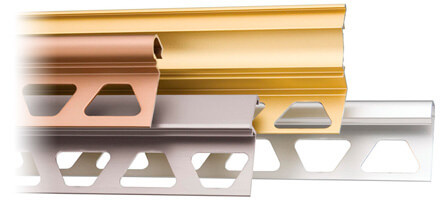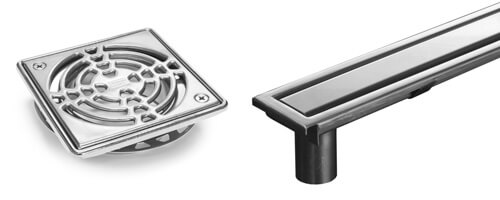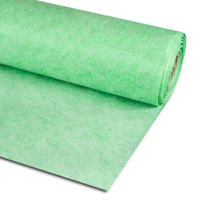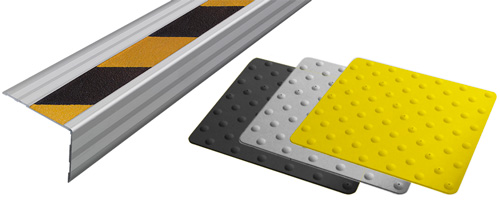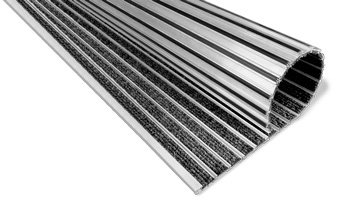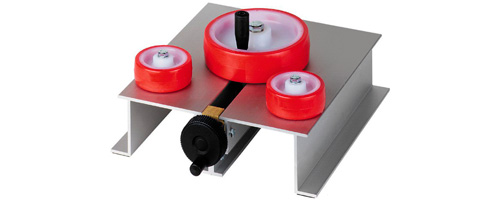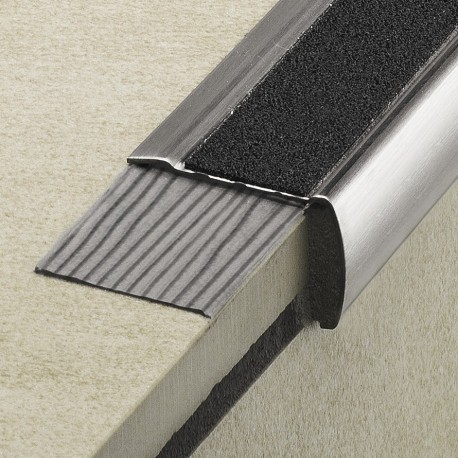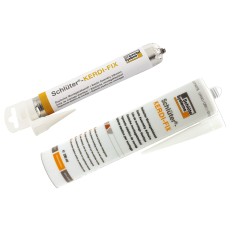Schlüter-TREP-G and -GL are stainless steel stair-nosing profiles with a special non-slip tread.
The profiles are suitable for the safe and visually appealing design of stairs with tiled or natural stone coverings, but can also be used with screed or other coating materials. Schlüter-TREP-GK and -GLK are variants without anchoring legs. The profiles are adhered to existing steps, e.g., for subsequent installation over damaged edges, eliminating the need to replace the entire step. Schlüter-TREP-G with a special non slip tread (classification R11) made of a coloured mineral grain tape is particularly suitable for applications in areas with heavy foot traffic e.g. business premises or in public buildings. Schlüter-TREP-GL with a special non slip tread (classification R10) made of profiled plastic insert is suitable for residential settings or areas with low foot traffic.
The stair-nosing profiles protect the front edge of stairs and add a high degree of safety due to the non-slip design of the tread and the excellent visibility of the steps. The non-slip treads are adhered to an indentation in the support profile to ensure that the edges of the adhesive tape are reliably protected.
The treads can be subsequently replaced in case of damage or wear. Matching end caps are available as accessories.
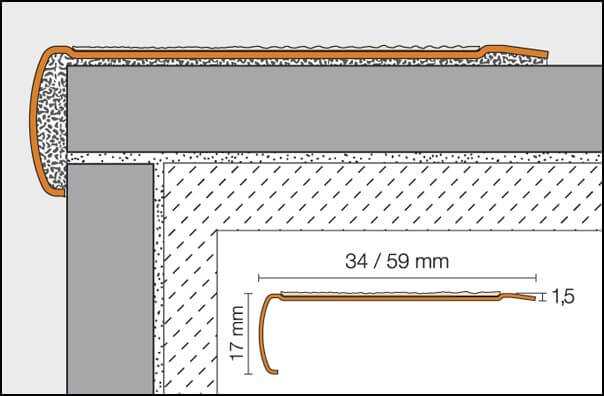
Material
The profiles are available in the following material variety:
- EB = brushed stainless steel V2A (material no. 1.4301 / AISI 304)
The profiles include an adhered non-slip tread:
Schlüter-TREP-G /-GK made of embedded mineral grit (R 11), Schlüter-TREP-GL /-GLK made of structured plastic (R 10).
The suitability of the selected profile type must be verified based on the anticipated chemical, mechanical, and/or other stresses.
Schlüter-TREP-G/-GL is particularly well suited for applications that involve heavy mechanical stresses and depending on their type, require resistance to chemicals such as acidic or alkaline substances or detergents. The profiles are designed for internal and external areas. However, please note that the transparent tread only has limited UV resistance and is intended for indoor use only.
Installation
- Select Schlüter-TREP-G / -GL according to the tile thickness.
- Align the covering material at the riser.
- Apply a suitable tile adhesive to the edge area above the stepr riser.
- Fill the hollow spaces on the underside of the profile with suitable tile adhesive. Note for steps 3 and 4: In case of thicker adhesive layers in the edge area, it may be necessary to add sand to the dry setting thin bed adhesive in accordance with manufacturer instructions or to use a medium bed mortar.
- Embed Schlüter-TREP-G / -GL fully into the adhesive bed and align the profile in such a way that the front edge of the profile covers the riser tiles.
- Trowel additional setting material over the trapezoid perforated anchoring leg and the tread of the stair step to ensure full coverage.
- Solidly embed the horizontal tiles and align them flush with the top edge of the profile. The tiles must be fully embedded in the area of the profile.
- Leave a joint of approximately 2 mm between the tile and the profile.
- Completely fill the space between the tile and the profile with grout. Prior to the application of grout, cover the non slip tread with a suitable adhesive tape.
- When integrating Schlüter-TREP-G / -GL into screed layers, fully embed the profile in the mortar and cover the trapezoid perforated anchoring leg with at least 15 mm of screed mortar.
Installation of Schlüter-TREP-GK / -GLK
- Clean the stair nosings and repair damaged areas if applicable.
- Clean or degrease the underside of Schlüter-TREP-GK.
- Adhere the profile by fully embedding it into a suitable adhesive (e.g. epoxy resin or Schlüter-KERDI-FIX, depending on the substrate). Note: The upper profile edge is approx. 1.5 mm higher than the stair covering.
Changing the non slip tread
When changing the non slip tread, ensure the surrounding temperature is at least 10 °C.
- Remove all residue of the previous selfadhesive tape.
- Prior to attaching the new tape, clean the surface of the profile with a solvent.
- Peel back approx. 5 cm of the protective liner and position the self-adhesive tape on the surface of the profile. Avoid touching the adhesive with your fingers.
- Peel the protective liner back further and gradually install the full length of the tape.
- Use a rubber roller to firmly press the self-adhesive tape into place. Always begin from the centre and roll toward the edges.
Maintenance
Schlüter-TREP-G and -GL require no special maintenance or care. It is recommended to regularly remove dirt and other residue (for example with a scrubbing brush) to maintain the non-slip function of the treads. stainless steel surfaces exposed to the environment or aggressive substances should be cleaned periodically using a mild household cleaner. Regular cleaning maintains the neat appearance of stainless steel and reduces the risk of corrosion. All cleaning agents must be free of hydrochloric and hydrofluoric acid. Do not use abrasive cleaning agents on the sensitive surfaces. Avoid contact with other metals, such as regular steel, to prevent corrosion. This also includes installation tools such as trowels or steel wool, e.g. for the removal of mortar residue.
The stainless steel cleaning polish Schlüter-CLEAN-CP may be used if necessary.
Self-adhesive tape as an accessory for subsequent replacement in case of damage or wear. The tape may also be installed for other purposes at the discretion and responsibility of the installer.

